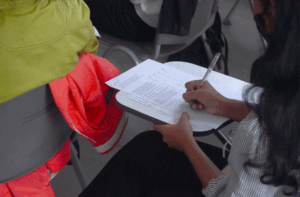ANA’s “culture of making use of mistakes” and the moment when students stop being afraid of making mistakes.
I think there are many students who think that “failure = scary”. So I talk about the “culture of making use of mistakes” at my old company, ANA.
Contents
For example, flight attendants.
ANA flight attendants do not hide their mistakes. When I was a new flight attendant, I was surprised that my direct superior did not blame me for my mistakes, but the same was true for the other seniors. No one gets angry at mistakes. I learned when I was a new employee that mistakes are “not something I need to hide”.
Senior flight attendants who receive a report of a mistake from a junior do not scold them. This is:
- Because mistakes happen to anyone.
- Because there are multiple factors behind a mistake, and it is often not just the person’s problem.
- Because mistakes are the greatest treasure that can prevent aircraft accidents.
For students who are afraid of failure, I talk about number 3.
First, let me refer the background of ANA’s culture of making use of mistakes.
All airline employees probably know that aircraft accidents are hugely caused by human error.
And in employee training, we regularly learn from past aircraft accidents around the world. We analyze the actions and situations of each employee, working backwards from the time of the accident, one by one, for each position, in great detail, and employees share their opinions.
At the end of the training, there are always opinions like these:
- I was able to reaffirm how important it is to create an environment where mistakes and slight discomforts can be shared.
- We may be a little hesitant to report our own mistakes, but I think that attitude of prioritizing safety over self-preservation is what a real professional should have.
- If information flows freely regardless of seniority, juniority, department, etc., aircraft accidents will definitely decrease.
This is the employee’s thinking and culture behind ANA’s habit of utilizing mistakes.
When a mistake actually occurs in the flight
For example, a flight attendant makes a mistake on board and reports it to a senior. The senior asks questions instead of blaming. They ask questions gently a loooooot.
- Oh, I see. Thanks for telling.
- Under what circumstances did that happen?
- I see. So that’s what you thought.
- By the way, why did you think that?
- Were you working on something else at the time?
- Was there anything else that bothered you?
- Tell me anything, even if it’s something that you think is unrelated.
- I see, I see. But this could happen to anyone, so I’m glad I got to ask.
- Maybe this will prevent other CAs from doing the same thing.
- Let’s report it when I get back!!
When they get back to base, the senior and junior make a report and submit it to the company.
The boss says.
It’s really helpful that you’ve looked back on things in such detail. Thank you. Good job.
The junior CA thinks. I made a mistake, but I’m glad I reported it honestly right away.
The senior CA thinks. I’m glad the junior reported it properly.
The next day, all CAs will be informed of the mistake to prevent it.
What students realized: “Mistakes are not something to hide, but to make use of.”
I talk about this ANA story with vivid examples, so the students listen intently. (Students love ANA stories!!)
And they share the following thoughts.
- I had only a bad image of mistakes, so my values have changed completely.
- I don’t want to make mistakes no matter what, but everyone makes mistakes, and I think what happens after you make a mistake is more important.
- I think mistakes are the things that must be welcomed!!
Many of the students have started their own businesses and are working in team, or are involved in projects, so they also expressed the following opinion.
- I think I have often blamed my members for their mistakes.
- I thought that I, as a president of my company, will start telling my members about my mistakes openly and share countermeasures right away.
- I think the reason I’m afraid of making mistakes is because of my education, and the business I’m thinking about now is also because I want to change that!!
These students are really reliable. I’m not explaining anything. I’m just telling my old stories.
Thank you, ANA.
My experiences at ANA are useful in my class.
Thank you, ANA. Thank you even after I leave.


